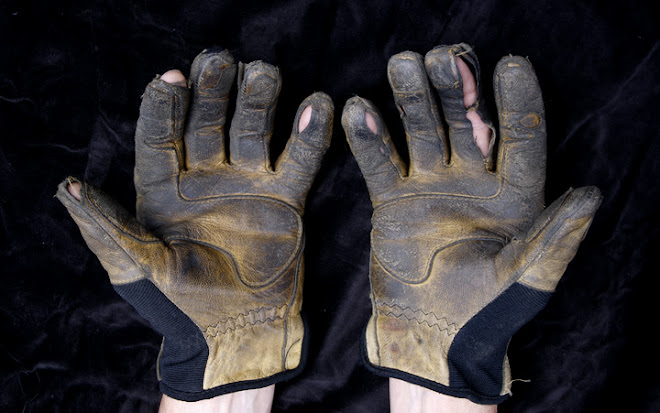Anybody who's been checking in here for a while know what this means...
We’re coming down the stretch on my current show, and as is the custom in television, the producers (prodded by the network, no doubt) want to “finish big.” That's why we’ve had at least three (and usually four) swing sets every week for the past month instead of the usual two. More sets means more lights means more work, and with the added weekend water-boarding of getting all my tax information collated and ready for the accountant, I’ve had too much on my hands to put any effort into several posts that remain in various stages of gestation.
In other words, I’ve got nothin’ this week. I'll try to be back with a real post in a week or two... or three. We'll see how it goes. In the meantime, it’s been a while since I did a “links” post -- serving up links to items I liked and you might -- so this is a good time.
The public radio program “Fresh Air” recently hosted a highly entertaining interview with Bryan Cranston, who went from “Malcolm in the Middle” to “Breaking Bad,” and in the process, carved out -- and fully inhabited -- one of the most interesting/horrifying leading roles ever seen on television. Running close to 45 minutes, this is a great listen.
If you have a hankering for more Cranston -- five additional minutes -- he recounts a funny story of how he almost became a cop, but was saved by a cute young actress who introduced him to the joys of thespianism. I couldn’t create a direct link, so you’ll have to click here, then scroll down to find the piece labeled “How Cranston almost became a police officer.”
Over the past couple of months I’ve become a fan of another industry blog called “The Big Waah,” which features consistently thoughtful, very well-written posts on many of the conundrums we all face working in the Dream Factory. In this post, she tackles the subject of creativity and why many of us in this business -- cogs in the industry machine -- still feel the drive to actually make things. The trick is finding a way to scratch that itch. Definitely worth a read.
Also on the subject of making things, KCRW’s “The Business” recently ran an interview with the producer of the new Veronica Mars movie, which created a minor media shit-storm among those outraged that Kickstarter was used to fund a feature film produced by more-or-less bankable stars. I didn't really care one way or the other -- hey, it wasn't my money -- so won't jump into that particular mosh pit again, but this interview offers an interesting perspective on the issue. The second part of the program talks with Daniel Adams, a director/producer who got in trouble -- and went to prison for nearly two years -- for manipulating the tax incentive program of Massachusetts to fund a movie. To quote from KCRW's website:
"Filmmaker Daniel Adams describes how and why he bilked Massachusetts out of millions in tax incentive money to pay for a movie. He went to prison for 21 months and now that he’s out he hopes to repay $4.3 million to the state through making movies."
Really, it’s a very human story about a man who found himself caught between a rock and a hard place, then saw a chance to escape and took it. If Adams didn’t exactly follow the murderous footsteps of Walter White, he did what he felt he had to and paid the price. Given that most of us at one time or another wind up facing a no-win situation, Adam’s honest assessment of how and why it happened serves as a cautionary tale.
Next up is a blog post from my favorite film critic, Mick LaSalle (who writes for the San Francisco Chronicle), explaining why hosting the Oscars just might be a Mission Impossible at this point. It’s a short post worth reading even if -- like me -- you really don't give a shit about the Oscars. Mick LaSalle is a very good writer, and if nothing else, you owe it to yourself to read the opening paragraph.
Last but not least is a fascinating report from Bob Garfield, co-host of On the Media (a terrific weekly public radio show) discussing the past, present, and future of television. Bob usually manages to be entertaining and informative in equal measures, and at fifteen minutes, this segment has the added virtue of relative brevity.
Every one of the above links is worth your time, so the choice is yours.
Check 'em out...




No comments:
Post a Comment